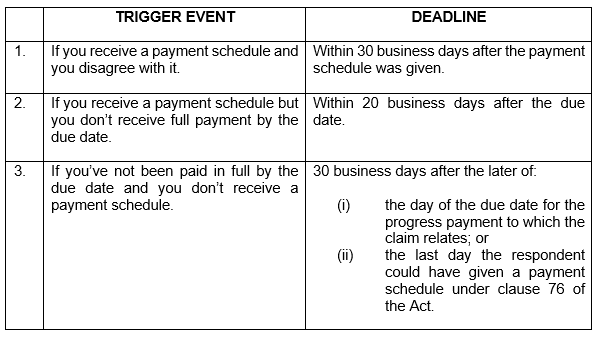As specialist construction lawyers, we act for a number of clients in adjudication proceedings. This guide sets out the adjudication process in a succinct and easy to understand manner.
What is adjudication?
The Building Industry Fairness (Security of Payment) Act 2017 (BIF Act) commenced on 17 December 2018. The Act provides for adjudication, which is a streamlined dispute resolution process that allows a party that has executed construction work or provided related goods and services to recover a disputed or unpaid progress payment.
Adjudication is a statutory based, alternative dispute resolution process where a qualified person, known as an adjudicator, is tasked with making a determination with respect to a payment dispute between parties. As adjudication is an alternative dispute resolution process, it falls outside of the court system and is relatively cheaper than litigation
When can an adjudication application be made?
Adjudication is run on very strict timelines. Clause 79 of the Act sets out the timeframes that determine when an adjudication application can be lodged. The table below sets out how and when an adjudication application can be made.
It is crucial that you adhere to the timeframes within which an adjudication application is to be filed. If you do not comply with the deadlines within which you must file an adjudication application, your adjudication application may be dismissed. Furthermore, it must be lodged on a business day, before 5:00 pm (AEST). It is important to note that any applications lodged after 5:00 pm (AEST) on a business day will be taken to be lodged the next business day.
Where can an adjudication application be made?
An adjudication application is lodged with the Registrar of the Queensland Building Construction Commission (QBCC).
What is usually contained in an adjudication application?
The Claimant (i.e. the person making the application) must complete the QBCC adjudication application form which is usually accompanied by the following:
• written submissions,
• a copy of the payment claim;
• a copy of the construction contract;
• a copy of the payment schedule (if there is one); and
• other supporting documents that may be relevant to the adjudication application.
You must also serve a copy of the adjudication application on the Respondent.
What happens once an adjudication application has been lodged?
After the adjudication application has been lodged, the QBCC must, within 4 business days of receipt of the adjudication application, refer the adjudication application to an accredited Adjudicator. If the accredited Adjudicator accepts the appointment as Adjudicator, he must serve the parties with a notice of acceptance within 4 business days after receiving the referral.
What happens once an Adjudicator has been appointed?
Once an Adjudicator has been appointed, the Respondent must file an Adjudication response within the later of the following periods:
(i) for standard claims (i.e. claims that are less than $750,000.00), 10 business days after being served with an adjudication application or 7 business days after being served with a notice of acceptance by the adjudicator; and
(ii) for complex claims (i.e. claims that are greater than $750,000.00), 15 business days after being served with an adjudication application or 12 business days after being served with a notice of acceptance by the adjudicator.
If an adjudication response is filed out of time, the Adjudicator will not consider it.
The adjudication response must be in writing and must identify the adjudication application to which it relates and may include written submissions.
It is important to note that the Act prohibits a Respondent from filing an adjudication response if the Respondent has not submitted a payment schedule. Furthermore, an adjudication response must not contain reasons that were not recorded in the payment schedule.
What happens after an adjudication response is filed?
The Adjudicator must now consider the adjudication application and the adjudication response and must then decide on the matter. The Adjudicator would ordinarily determine whether the Respondent owes the Claimant any monies, the date on which such monies became due and any interest.
The Adjudicator is required to hand down a decision within strict time frames. An Adjudicator must make a decision no later than:
(i) for standard payment claims, 10 business days after the adjudicator is given the adjudication response and where no adjudication response has been given, the last day on which the adjudicator receives the response; or
(ii) for complex payment claims, 15 business days after the adjudicator is given the adjudication response and where no adjudication response has been given, the last day on which the adjudicator receives the response.
What happens after an Adjudicator makes a decision?
The answer to this question depends on whether or not the Adjudicator awards an amount to be paid.
If the Adjudicator decides that an amount is to be paid by the Respondent, the Respondent is required to pay the amount to the Claimant on or before the day that is 5 business days after the day on which a copy of the Adjudicator’s decision is given to the Respondent by the Adjudicator or if the Adjudicator decides a later date for payment, then by such later date.
What is an adjudication certificate?
An adjudication certificate is usually only issued where the Respondent is required to pay an amount.
As soon as practicable after being given a copy of the decision by the Adjudicator, but no later than 5 business days after being given the decision, the QBCC must give the Claimant an adjudication certificate of the decision which sets out the following details:
(i) the name of the Claimant;
(ii) the name of the Respondent;
(iii) the adjudicated amount;
(iv) the date on which payment of the adjudicated amount is required to be paid;
(v) the rate of interest that is applicable; and
(vi) the costs that the Respondent is required to pay.
What happens if payment of an adjudicated amount is not made?
If the Respondent fails to make payment in whole or in part, the Claimant may:
(i) give the Respondent written notice of the Claimant’s intention to suspend works or supplying related goods and services; and/or
(ii) file the adjudication Certificate as a judgment for a debt.
As the above suggests, adjudication is a quick, cost effective method of getting paid for construction works or supplying related goods and services.
However, in order to ensure that your rights are protected and preserved, it is imperative that the provisions of the Act, in particular the strict time frames, are complied with.
Rostron Carlyle Rojas have an expert team of specialist building and construction lawyers.
If you have a question or you’d like more information on the content of this article, contact us today on (07) 3009 8444 or email us at [email protected].



